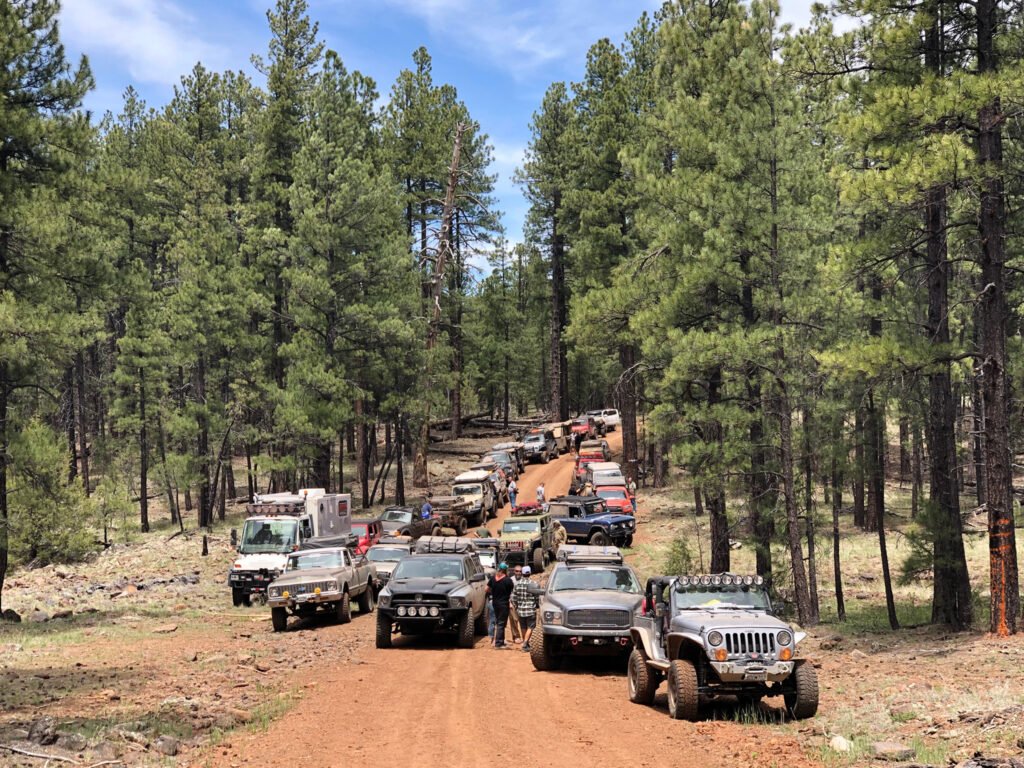The Secret to Good Trail Teamwork
By Nena Barlow
This article originally appeared on fourwheeler.com.
When Ken Brubaker of Four Wheeler magazine, Jp's sister publication, asked me to guide the first Overland Adventure, one of my biggest concerns was how to bring together a group that was going to be far more diverse than the usual all-Jeep run. With everything from rock crawling Wranglers to overland monsters like John Marshall's U-600 Unimog, and a smattering of various off-road trailers, the vehicles and the experience of the participants were vastly different. We planned to travel from Wickenburg to Prescott and onward to Overland Expo in Flagstaff—via 260 miles of backroads over three days. What came of this eclectic event was a lesson in teamwork and camaraderie unparalleled in any other large groups I have led.
The first test of the group was just getting through registration. With 38 vehicles in the line, I expected us to stretch out up to a mile at times. That makes communication by radio difficult in Arizona's famous canyon-laced terrain. Rugged Radios provided handheld radios for the event, and as powerful as they were, we were lucky to have several helpers and staff members, including our mid-gunner Rick Péwé, to relay communications back and forth—ensuring that even in the tight, twisty canyons everyone took the correct turns in the trail. This worked even more effectively because everyone observed good radio etiquette, keeping transmissions clear and brief.
The second test of the group was our first mechanical breakdown—less than two hours into the trail on the first day. One of the Ram 1500s broke a front axle and was mid-hill on a nasty optional 4x4 climb out of a wash. Though we had plans to handle such contingencies, the preparation of the participants changed this from a significant breakdown to a minor 30- minute lunchtime fix. Guido Kimble offered up the power tools on his M-1078 LMTV, and Dan Cressall offered up the spare axle (and vehicle knowledge) from his Ram 1500. Both jumped on the challenge enthusiastically, and the injured 1500 was able to finish the rest of the trip on its own.
Then there were the multiple vehicles pulling trailers, which were having overheating issues on our brutal Arizona mountain grades. Without hesitation, bigger rigs offered to pull the trailers for them, so the smaller rigs could cool down and continue with the group. And, if that wasn't enough, the group also leapt into action when a passing UTV caught fire from their leaking gas can. Scott Lewis and Dan Cressall (again) were right there with their fire extinguishers before the UTV driver even knew what was going on. The members of our group had come prepared.
The support didn't end when we got to camp. The smaller rigs were courteous about letting the bigger rigs get placed first and then they snuggled in where there was space for them. Participants shared their favorite beverages with each other and laughed about the day's adventures. Some helped others make repairs. Some brought around cinnamon rolls in the morning.
It struck me how just a few small actions made such a huge difference in how well the group moved together, and in how enjoyable it was to spend three days with these people. Beyond being a wonderful example of how the cooperation of a diverse group of 4x4s can work together to make a trip as smooth and fun as possible, it made me wonder what our communities would be like if this was how we lived every day with our neighbors?



